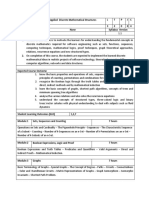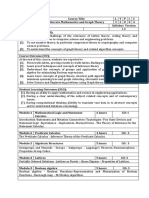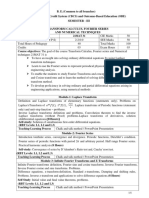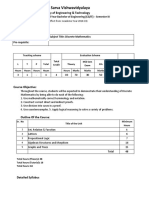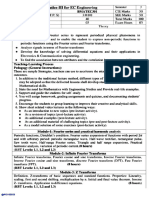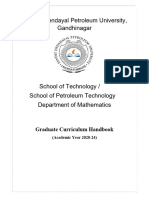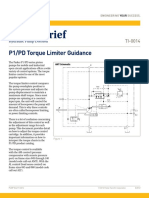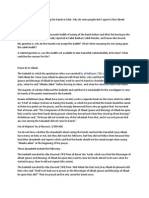Mat1001 Fundamentals-Of-Mathematics TH 1.1 47 Mat1001
Mat1001 Fundamentals-Of-Mathematics TH 1.1 47 Mat1001
Uploaded by
Tanay KuchloryaCopyright:
Available Formats
Mat1001 Fundamentals-Of-Mathematics TH 1.1 47 Mat1001
Mat1001 Fundamentals-Of-Mathematics TH 1.1 47 Mat1001
Uploaded by
Tanay KuchloryaOriginal Description:
Original Title
Copyright
Available Formats
Share this document
Did you find this document useful?
Is this content inappropriate?
Copyright:
Available Formats
Mat1001 Fundamentals-Of-Mathematics TH 1.1 47 Mat1001
Mat1001 Fundamentals-Of-Mathematics TH 1.1 47 Mat1001
Uploaded by
Tanay KuchloryaCopyright:
Available Formats
FUNDAMENTALS OF MATHEMATICS L T P J C
MAT1001
(Bridge Course)
3 2 0 0 4
Pre-requisite Nil Syllabus version
1.1
Course Objectives:
This fundamental course on Basic Mathematics provides requisite and relevant background necessary
to understand the other important engineering mathematics courses. Further this course is a
prerequisite for the non- mathematics students to learn further topics of Engineering Mathematics.
Expected Course Outcome:
At the end of this course the students are expected to
1. Solve a system of linear equations by matrix
2. Apply the techniques of differentiation to find maxima and minima, and techniques of
integration to evaluate areas and volumes of revolution
3. Understand the concept of ordinary differential equations, and first and second order linear
differential equations
4. Have a clear understanding of analytic geometry and vector
5. Apply concepts of mathematical logic and elementary probability to real life problems
Student Learning Outcomes (SLO): 1,2,7, 9
Module:1 Matrices 5 hours
Matrices - types of matrices - operations on matrices-determinants - adjoint matrix -inverse of a matrix
-solution of a system of linear equations by inversion method–elementary transformations –rank of a
matrix - consistency and inconsistency of system of equations
Module:2 Differential Calculus 6 hours
Differentiation of functions of single variable – differentiation techniques physical interpretations -
differentiation of implicit function – higher order derivatives – Taylor’s series - maxima and minima
for functions of a single variable
Module:3 Integral Calculus 6 hours
Partial fractions - Integration- integration techniques- integration by parts definite integrals –
properties- evaluation of area and volume by integration
Module:4 Linear Ordinary Differential Equations 6 hours
Differential equations-definition and examples- formation of differential equation- solving differential
equations of first order-solving second order homogenous differential equations with constant
coefficients.
Module:5 Analytic geometry 5 hours
Analytic geometry of three dimensions-direction cosines and direction ratios-plane, straight line and
sphere
Module:6 Vector Algebra 7 hours
Vectors–operations on vectors-angle between two vectors-projection of one vector on another vector–
equations of plane, straight line and sphere in vector forms-shortest distance between two skew lines-
equation of a tangent plane to a sphere.
Module:7 Logic and Probability 8 hours
Mathematical logic – propositions – truth table – connectives– tautology – contradiction. Permutations
and combinations – probability – classical approach – addition law- conditional probability -
multiplicative law- Baye’s theorem and applications.
Module:8 Contemporary Issues 2 hours
Total Lecture hours: 45 hours
A minimum of 10 problems to be worked out
by students in every Tutorial Class.
Another 5 problems per Tutorial Class to be
30 hours
Tutorial given as home work.
SLO: 1,2,7, 9
Mode: Individual Exercises, Team Exercises, Online
Quizzes, Online Discussion Forums
Text Book(s)
1. K. A. Stroud and Dexter J. Booth, Engineering Mathematics, 2013, 7th Edition, Palgrave
Macmillan.
Reference Books
1. B. S. Grewal, Elementary Engineering Mathematics, 2015, 43rd edition, Khanna Publications.
2. Seymour Lipschutz and Marc Lipson, Discrete Mathematics, 2010, 3rd Edition, Tata McGraw -
Hill.
3. Seymour Lipschutz and John Schiller, Introduction to Probability and Statistics, 2011, 2nd Edition,
Tata McGraw -Hill.
Mode of Evaluation: Digital Assignments(Solutions by using soft skill), Quiz, Continuous
Assessments, Final Assessment Test
Recommended by Board of Studies 21-08-2017
Approved by Academic Council No. 47 Date 5-10-2017
You might also like
- The Best of Bald and BankruptDocument20 pagesThe Best of Bald and BankruptBenjamin Hasić100% (6)
- Manalo, Cristian James P. January 22, 2021 BSA 2-11 SawsaDocument6 pagesManalo, Cristian James P. January 22, 2021 BSA 2-11 SawsaCristian James ManaloNo ratings yet
- Task 2. English ConversationDocument5 pagesTask 2. English ConversationMarianny GarciaNo ratings yet
- MAT5001 Foundations-Of-Mathematics ETH 1 AC40Document3 pagesMAT5001 Foundations-Of-Mathematics ETH 1 AC40Karan DesaiNo ratings yet
- Mat1014 Discrete-mathematics-And-graph-Theory TH 1.1 47 Mat1014Document3 pagesMat1014 Discrete-mathematics-And-graph-Theory TH 1.1 47 Mat1014Rishabh RathiNo ratings yet
- Mat5005 Advanced-Mathematical-Methods TH 1.0 40 Mat5005Document3 pagesMat5005 Advanced-Mathematical-Methods TH 1.0 40 Mat5005Abid YusufNo ratings yet
- Numerical MethodsDocument2 pagesNumerical MethodsermiasNo ratings yet
- Mat1016 Applied-Discrete-Mathematical-Structures TH 1.1 47 Mat1016Document3 pagesMat1016 Applied-Discrete-Mathematical-Structures TH 1.1 47 Mat1016Shubh ChoudharyNo ratings yet
- TCET FE Applied Mathematics - I (2018-2019)Document196 pagesTCET FE Applied Mathematics - I (2018-2019)Kevin100% (1)
- Semester Ii: Discipline: CIVIL ENGINEERING Stream: CE2Document70 pagesSemester Ii: Discipline: CIVIL ENGINEERING Stream: CE2mohdsabithtNo ratings yet
- 1-Material Mat3005 SyllabusDocument3 pages1-Material Mat3005 Syllabussahale shera100% (1)
- Maths 11Document2 pagesMaths 11rit dharNo ratings yet
- Kadi Sarva Vishwavidyalaya: Faculty of Engineering & TechnologyDocument3 pagesKadi Sarva Vishwavidyalaya: Faculty of Engineering & TechnologychiragNo ratings yet
- App Maths-1 PDFDocument4 pagesApp Maths-1 PDFVaibhav AgarwalNo ratings yet
- 22mats11 PDFDocument6 pages22mats11 PDFB ABNo ratings yet
- 21MAT756Document3 pages21MAT756krithesh510No ratings yet
- 22MATS11Document5 pages22MATS11vedika singhNo ratings yet
- Se3 4 ExtcDocument31 pagesSe3 4 ExtcMujibur Rehman AnsariNo ratings yet
- HiDocument2 pagesHiPRANAV KUMAR 17BEC0473No ratings yet
- BMATS101Document5 pagesBMATS101Shankha Suvro DuttaNo ratings yet
- B231741534 (1)Document125 pagesB231741534 (1)anushasajjan9323No ratings yet
- B.SC - Maths 6th Sem FinalDocument10 pagesB.SC - Maths 6th Sem Finalबिप्लु शइकीयाNo ratings yet
- 21mat31 Model Question Paper VTU 3rd Sem 21 SchemeDocument4 pages21mat31 Model Question Paper VTU 3rd Sem 21 Schemeyoung flier0% (1)
- Applied MathematicsIIDocument3 pagesApplied MathematicsIIKeshav KumarNo ratings yet
- CC302B N Discrete MathematicsDocument3 pagesCC302B N Discrete Mathematics21BECE3O151 DEV OZA N.No ratings yet
- 22MATS11Document5 pages22MATS11Ashutosh kumar MishraNo ratings yet
- 22MATM11Document6 pages22MATM11rakshaNo ratings yet
- MecsyllDocument152 pagesMecsyllArun C DixitNo ratings yet
- 22MATS21Document5 pages22MATS21ajayicon115No ratings yet
- 227E3ADocument2 pages227E3AJovitha JoelNo ratings yet
- 22MATE11Document5 pages22MATE11Gayatri JoshiNo ratings yet
- 2 EesyllDocument77 pages2 EesyllDileepNo ratings yet
- BSC H Mathematics1styearDocument98 pagesBSC H Mathematics1styearbalad92538No ratings yet
- 124E1ADocument2 pages124E1AParthiban DevendiranNo ratings yet
- BMATS201Document5 pagesBMATS201Nithin GowdruNo ratings yet
- 22MATE11Document5 pages22MATE11New GenieNo ratings yet
- 120E1ADocument2 pages120E1AAsha HariNo ratings yet
- Mat3004 Applied-linear-Algebra TH 1.1 47 Mat3004Document2 pagesMat3004 Applied-linear-Algebra TH 1.1 47 Mat3004Garvit GuptaNo ratings yet
- MathematicsDocument7 pagesMathematicsdyi1ng.dyingNo ratings yet
- 3-sem_Mech_15EMAB201(24-25)Document39 pages3-sem_Mech_15EMAB201(24-25)chipativijayNo ratings yet
- Engg Maths1Document4 pagesEngg Maths1AnuNo ratings yet
- SyllabusDocument3 pagesSyllabusrsyed2704No ratings yet
- Discrete Mathematical StructuresDocument4 pagesDiscrete Mathematical StructuresRaghu NandanNo ratings yet
- Mathematics Courses in B Tech - Department of MathematicsDocument19 pagesMathematics Courses in B Tech - Department of Mathematicsrajjoshi94380No ratings yet
- Sem 4Document29 pagesSem 4Student AkashNo ratings yet
- Mat 1001Document3 pagesMat 1001Taran MamidalaNo ratings yet
- 21ADM311Document2 pages21ADM311jjNo ratings yet
- Linear Algebra (18BS4CS01) : 4 Sem - 2018 BatchDocument17 pagesLinear Algebra (18BS4CS01) : 4 Sem - 2018 BatchAyush Kumar 20BTRIS004No ratings yet
- CDF MTH242 Differential EquationsDocument8 pagesCDF MTH242 Differential Equationskashifkhanchandio03050% (1)
- 22MATE21Document5 pages22MATE21vikram kharviNo ratings yet
- 2022 SyllabusDocument188 pages2022 SyllabuspawanpNo ratings yet
- Mat511 Advanced-Numerical-Methods TH 1.10 Ac26Document2 pagesMat511 Advanced-Numerical-Methods TH 1.10 Ac26Karan DesaiNo ratings yet
- B.Tech 2024 1stYearSyllabus Group-B Ktustudents - inDocument182 pagesB.Tech 2024 1stYearSyllabus Group-B Ktustudents - inmeeramohan.cseNo ratings yet
- Discrete Course Objective-OutlineDocument7 pagesDiscrete Course Objective-Outlineiiui.student.islamabade.edu.pkNo ratings yet
- ENGINEERING MATHEMATICS I Syla PDFDocument4 pagesENGINEERING MATHEMATICS I Syla PDFpavaniiNo ratings yet
- Sem I Syllabus BSC (Hons. Physics)Document13 pagesSem I Syllabus BSC (Hons. Physics)Rizwan ChoudharyNo ratings yet
- Department of Physics Bsc. (Hons.) Physics: Discipline Specific Core Course - 1 (Dsc-1) Mathematical Physics IDocument96 pagesDepartment of Physics Bsc. (Hons.) Physics: Discipline Specific Core Course - 1 (Dsc-1) Mathematical Physics IHimanshu JoshiNo ratings yet
- Ada SyllabusDocument3 pagesAda SyllabusSiddaraju SNo ratings yet
- Fem PDFDocument3 pagesFem PDFJavedNo ratings yet
- Chemsyll - PDF 3Document18 pagesChemsyll - PDF 347No ratings yet
- Matrix Operations for Engineers and Scientists: An Essential Guide in Linear AlgebraFrom EverandMatrix Operations for Engineers and Scientists: An Essential Guide in Linear AlgebraNo ratings yet
- Full Interpreting and Using Statistics in Psychological Research Andrew (Drew) N Christopher Ebook All ChaptersDocument62 pagesFull Interpreting and Using Statistics in Psychological Research Andrew (Drew) N Christopher Ebook All Chaptersrobkalapina58100% (4)
- 2802-Article Text-5255-1-10-20210220Document13 pages2802-Article Text-5255-1-10-20210220Nguyễn Đức TrungNo ratings yet
- Papa PublicDocument22 pagesPapa PublicKenneth LeeNo ratings yet
- Most Expected Css QuestionsDocument7 pagesMost Expected Css QuestionsMůṥāwwir Abbāś AttāriNo ratings yet
- ENGLISH Category 4 5 6 - GradesDocument3 pagesENGLISH Category 4 5 6 - GradesFatima AliyevaNo ratings yet
- ISA SymbologyDocument41 pagesISA SymbologyBagus AtmajaNo ratings yet
- Presentation, Analysis and Interpretation of DataDocument8 pagesPresentation, Analysis and Interpretation of DataEarl TamayoNo ratings yet
- Communicating With Members of The Workplace EffectivelyDocument4 pagesCommunicating With Members of The Workplace EffectivelyAhnNo ratings yet
- Investment Analysis CourseDocument5 pagesInvestment Analysis CourseDDNo ratings yet
- Analysis of Relationships Between High School Students - Career Maturity, Career Decision-Making Self-Efficacy, and Career Decision-Making Difficulties (#1067535) - 2230073Document16 pagesAnalysis of Relationships Between High School Students - Career Maturity, Career Decision-Making Self-Efficacy, and Career Decision-Making Difficulties (#1067535) - 2230073Widya ANANo ratings yet
- P1PD Torque Limiter GuidanceDocument5 pagesP1PD Torque Limiter GuidancexxshNo ratings yet
- What Appeals To MillennialsDocument6 pagesWhat Appeals To MillennialsdscheenaardNo ratings yet
- Axis Rule in Occupied Europe by Raphael LemkinDocument708 pagesAxis Rule in Occupied Europe by Raphael Lemkintheo.coppenNo ratings yet
- Oracle OIC Analytics and Oracle OBIEEDocument2 pagesOracle OIC Analytics and Oracle OBIEEsnaik44No ratings yet
- John Keats DissertationDocument5 pagesJohn Keats DissertationBestOnlinePaperWritersBillings100% (2)
- Kyrie Eleyson - Christe Eleyson-Kyrie EleisonDocument3 pagesKyrie Eleyson - Christe Eleyson-Kyrie EleisonRené MateiNo ratings yet
- Trolo LolDocument7 pagesTrolo LolAnonymous P1iMibNo ratings yet
- Performing An Automated InstallationDocument24 pagesPerforming An Automated InstallationDaniel SouzaNo ratings yet
- Sun PlanetDocument1 pageSun PlanetMihail MihailNo ratings yet
- SCST CertificateDocument8 pagesSCST CertificateKumar KiranNo ratings yet
- Cranberry Juice and InflammationDocument84 pagesCranberry Juice and InflammationTeresa BeckNo ratings yet
- Ayurveda and The Mind The Healing of Consciousness David Frawley.12821 - 2prefaceDocument6 pagesAyurveda and The Mind The Healing of Consciousness David Frawley.12821 - 2prefaceJayvin PandeeyaNo ratings yet
- BT 514-P Analytical Chemistry ManualDocument33 pagesBT 514-P Analytical Chemistry ManualkainatabdulghafoorNo ratings yet
- A. 2) Chinese Young MenDocument3 pagesA. 2) Chinese Young MenAlfred Bryan33% (3)
- Rafa DhainDocument23 pagesRafa DhainmagforuNo ratings yet
- Development of The SonnetDocument2 pagesDevelopment of The SonnetFahiem Chaucer75% (4)
- Chapter 1,2,3Document33 pagesChapter 1,2,3Arklon N. PerezNo ratings yet








